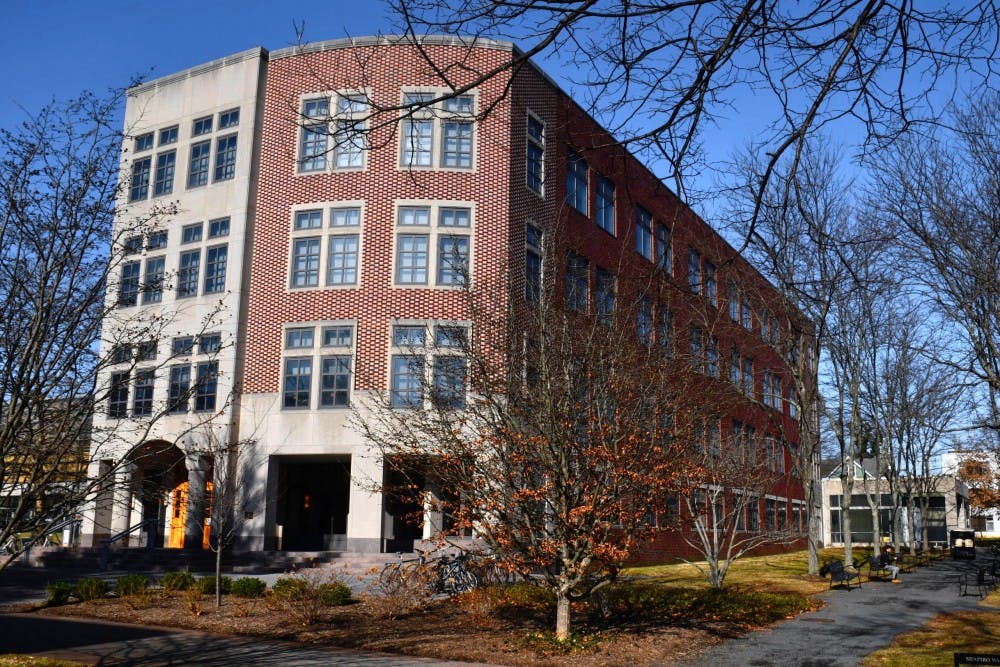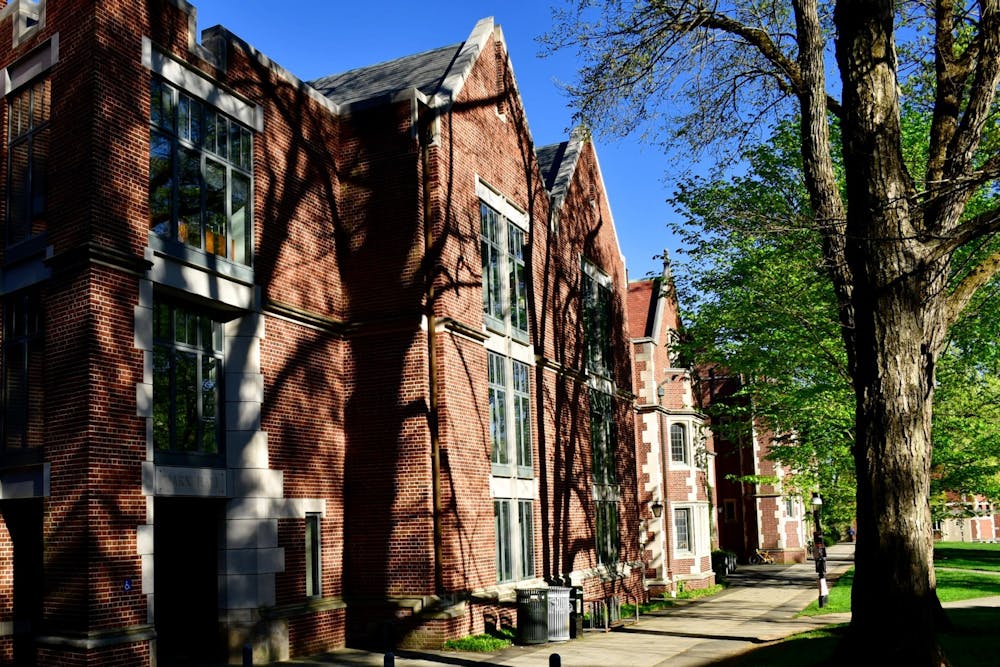In an email to students on Monday, May 4, University President Christopher L. Eisgruber ’83 wrote that faculty members have been instructed to begin planning courses under the assumption that remote learning will continue into the fall. The ultimate decision of whether to hold the fall term on campus or online will not be announced until early July.
To understand what that planning has entailed so far, The Daily Princetonian reached out to the heads of every academic department and heard back from 14 out of 36. While most stated that their current focus is the end of the spring term, saving fall planning for the summer, some professors are already hard at work developing contingency plans for a fully or partially online fall semester.
Professor Jennifer Rexford ’91, chair of the computer science department, is already instructing members of her department on how to prepare for a fall semester that, in her words, “could very well be virtual.”
“I’m no expert, but I think the likelihood that we at least start virtual is pretty high,” she said. “And the other issue is that even if somehow we were to start physically, there may be enough people who either can’t get back to campus or shouldn’t be in a residential setting — and that includes some faculty — that there may be a set of courses that continue to be at least partially virtual even if the students are on campus.”
Rexford believes that a “hybrid model” — one that combines both in-person and online learning — would, in some ways, prove more challenging to navigate than the online classes currently in place.
“In that case, you have a very imbalanced situation, where some people might be experiencing the course virtually, while the rest of the students and faculty are not,” she explained.
Professor Carolyn Rouse, chair of the anthropology department, said she recommended her department’s faculty design fall courses that incorporate both an in-person and an online component. Some courses may hold online precepts and in-person lectures, and others, vice versa, depending on the strengths and weaknesses of each class.
Rouse emphasized the importance of interpersonal learning — “something has to be in-person,” she stressed. Rouse admitted, however, that some limitations seem inevitable for the fall term. She cited office hours as one example, given the risk of viral transmission inherent to any one-on-one setting.
“Office hours online may actually work better for students, I don’t know,” she said.
Rouse also said that she will recommend each course have a “back-up professor”: an instructor in the department who is familiar enough with the syllabus and material that they could teach the course for several weeks, in the event that a professor went into quarantine.
Professor Alan Patten, chair of the politics department, noted that the hybrid model could present technical difficulties.
“Acoustics can be very difficult,” he explained, especially when some members of a class converse in a room, while a few others join via computer.

For Rouse, the hybrid model has a significant upshot: faculty would be prepared if the University were to announce an online-only fall.
“If, say, the University decides, ‘No, we can’t take the risk’ — which would be a shame because people could catch [COVID-19] anywhere — our faculty will already have designed enough of the stuff online that they’re ready to go in that respect,” she said.
Still, planning for multiple contingencies is “not optimal,” Professor Judith Weisenfeld GS ’92, chair of the religion department, wrote in an email to the ‘Prince.’ She stressed that her department looks forward to “being able to format plans for the semester once the University has made a decision.”
Hearing from students and colleagues
For most professors, contingency planning at this stage revolves around learning what worked well and what fell short in the transition to online learning this spring.
The mathematics department, according to Professor János Kollár, the department’s director of undergraduate studies, has formed a committee of “five of our most dedicated teachers,” who will be in charge of making recommendations for the fall semester.
Some faculty members in the religion department have participated in discussion groups with colleagues at peer institutions, according to Weisenfeld.
Patten said the politics department has prepared a survey for this semester’s teaching faculty.
“At this point, we’re trying to gather data,” he said. “Find out what worked, what hasn’t, what adjustments we’ll need to make.”
Based on feedback he has already received, Patten believes that smaller groups are integral to successful online teaching. His department will seek to “minimize the size of our sections as much as possible.”
Professor Michael Flower, chair of the classics department, emphasized the importance of student input in devising these plans. He expressed hope that students will provide valuable feedback in teaching evaluations for the spring term.

The Computer Science building.
Jon Ort / The Daily Princetonian
Similarly, Rexford is considering how to engage the department’s current students in the decision-making. One possibility, she said, is working with students, particularly those whose summer plans have fallen through due to the crisis, to develop the plans, thus providing students with a summer opportunity while also assisting the department.
The economics department has already gathered feedback from students, according to the department’s executive director of undergraduate studies, Professor Smita Brunnermeier. According to her, the department learned that the transition to online learning, especially for large economics classes, most adversely impacted students with health concerns, financial need, or academic need.
“In response, we have developed free, limited enrollment, online summer courses for ECO 100 and ECO 101 that will be offered to students with academic or financial need,” Brunnermeier wrote to the ‘Prince.’
These summer courses will not only benefit the students who take them, she explained, but also allow faculty an opportunity to “trial run” an entire semester of online teaching.
Brunnermeier expressed similar concerns to Patten, stating that in an effort to reduce class size, her department will be offering its core courses in both semesters, including ECO 300/310: Microeconomics, ECO 301/311: Macroeconomics, and ECO 302/312: Econometrics.
Communal responsibilities in online learning
With the exception of a handful of student organizations, which have kept up activity online, Zoom classrooms are now the only University-affiliated “spaces” students enter in a given week. In Flower’s view, that fact confronts educators with a crucial responsibility.
“Much more is at stake than just imparting information,” he wrote. “We need to use the online classroom as a venue in which students can connect with each other and feel that they are part of the Princeton community.”
He added that his own plan for the fall is to provide his students with an “enhanced online experience,” including extra study sessions and, “perhaps more importantly, time for just talking about their concerns and activities.”
Rexford agreed, adding that facilitating classroom community is all the more important for introductory or majority-first-year classes, since those courses may be the Class of 2024’s first exposure to the University.
“For people starting in the fall without understanding the community, without knowing their classmates and colleagues, there’s a much different responsibility for us,” she said. “In some of those lecture classes, we have to build a sense of community and a sense of norms that they otherwise wouldn’t be able to pick up on well.”
One way of fostering communal ties, Rexford said, could be through opportunities to work in pairs on projects — “maybe even more than normal.”
Flower emphasized that the guiding principle in devising online faculty-student mentorship will be ensuring undergraduates feel “engaged, supported, and appreciated.”
Academic rigor in the Zoom classroom
While all the professors interviewed stated that grading policy decisions will ultimately rest with the University, some expressed concern about what an entire semester online would mean for academic standards.
In Rexford’s view, the compromises some courses, particularly upper-level ones, made this semester with regard to rigor — such as accepting late submissions, dropping assignments, or changing their weighting — are not sustainable for the long term.
“This semester, for the most part, people said, ‘Hey, we’re going to be much more lax about this,’” she said. “One thing we’re struggling with, particularly with our intro courses, is we really can’t afford to drop the rigor because it will put students at a disadvantage for several years, as that course is a prerequisite to others.”
Rexford explained that such compromises would be particularly difficult in STEM subjects, “where things really do build on one another, so being underserved in one course will underserve you more broadly.”
Rouse took a different approach, noting how a continuation of a pass/D/fail policy at the University could spark a change in the campus culture’s approach to defining success.
“I hate grades, let’s just be honest,” she said. “I think college should be a place where students really feel comfortable exploring, and not necessarily always being all-in in that exploration ... Imagine a university where people are taking courses because they are really curious but don’t necessarily have the talent for it.”
Although she conceded, “it’s not in my wheelhouse to decide this,” Rouse said she “would be very happy to find a way to substitute out our traditional grading system and introduce something a little more innovative.”
She pointed to the example set by Brown University, which allows students to take an unlimited number of courses as “Satisfactory/No Credit.”
“Princeton might want to think more about embracing that and encouraging a culture of excellence — which is always the case — but even without that kind of [A-F grading] metric,” Rouse added.
Committees, conversations, and collaboration
Both Rexford and Patten confirmed that the University has recently formed a new committee on planning online learning for the fall, chaired by Vice President for Information Technology and Chief Information Officer Jay Dominick and Director of the McGraw Center for Teaching and Learning Kate Stanton.
Dominick and Stanton both deferred comment to the University Office of Communications, which stated it has nothing to add at this point to Eisgruber’s May 4 letter.
Moving forward, cross-departmental collaboration will likely be crucial to a smooth transition online for the fall, in the event that one is necessary. Rexford believes the computer science department could have an important role to play in assisting other departments’ planning.
In particular, the department has a number of online processes in place for independent work, since it advises as many as 200 undergraduates every semester. Rexford explained that to keep track of everyone making progress, the department uses an online portal and institutionalized checkpoints.
“Other departments that have large numbers of students might benefit from having that infrastructure in place to help make sure that people don’t fall through the cracks, during a time when it’s really easy for that to happen,” she said.

The panel was hosted inside Laura Wooten Hall.
Jon Ort / The Daily Princetonian
Across departments, professors will begin the difficult work of working out the minute details of a potential online fall.
For the religion department, Weisenfeld wrote, that may mean reassessing assignments and activities that depend on fieldwork, community engagement, and possibly access to archives, as well as postponing a class that requires international travel.
For the economics department, it may mean developing additional support for senior theses; already, the department has created a summer research fund for 30–40 seniors who want to get a head start on their independent work, according to Brunnermeier.
Professors continue to grapple with the challenge of time zones. Rexford, for one, floated the idea of hosting a COS 126 precept in the middle of the night for Eastern Standard Time to accommodate students living in Asia.
Still, many professors are just struggling to keep up with the evolving COVID-19 crisis, piled on top of the biannual chaos of Dean’s Date.
“We have been struggling with the present situation and have not had any discussions about the fall as of yet,” wrote Professor Michael Wachtel, chair of the Department of Slavic Languages and Literatures, prior to Eisgruber’s announcement.
“We’ll probably only do that after the University makes its decision … Until then, we have plenty of other things to worry about.”
Like Wachtel, Professor Mark Watson of the Woodrow Wilson School, Professor Catherine Peters of the Department of Civil and Environmental Engineering, Professor Howard Stone of the Department of Mechanical and Aerospace Engineering, Professor Göran Blix of the Department of French and Italian, and Professor Bess Ward of the Department of Geosciences all said they had not yet begun planning for the fall or could not provide comment about their efforts.
“I feel for my colleagues, who might for their own reasons be understandably nervous about going back into the classroom while we’re still dealing with the effects of the pandemic,” Patten said.
One thing everyone seems to agree on? In Patten’s words: “This is an incredibly difficult problem.”








